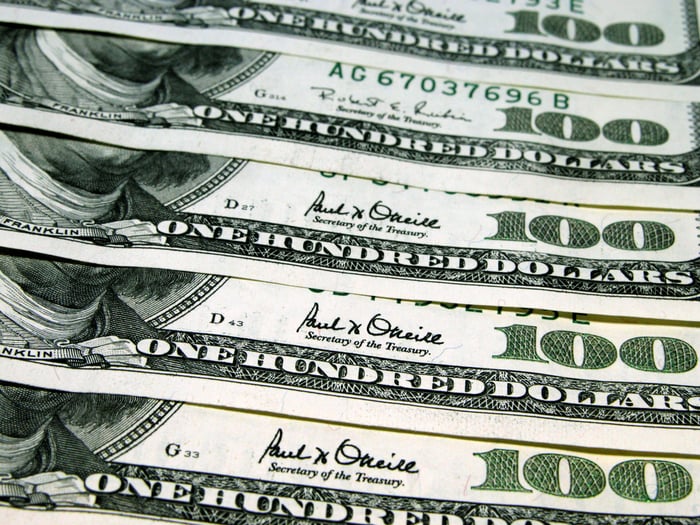While there are countless ways to make money on Wall Street, investing in dividend stocks over the long run tends to be one of the most successful.
Historically, income stocks have run circles around publicly traded companies that don't pay a dividend to their shareholders. Based on the findings of a report from the wealth management division of JPMorgan Chase in 2013, public companies that initiated and grew their payouts over 40 years (1972-2012) averaged an annualized return of 9.5%. By comparison, public companies that didn't offer a payout scraped and clawed their way to a meager annualized return of 1.6% over the same four-decade stretch.
Since companies that pay a regular dividend are usually time-tested, profitable on a recurring basis, and are able to provide investors with transparent long-term growth outlooks, it's really no surprise that they've outperformed non-payers so significantly over the long run.

Image source: Getty Images.
However, nabbing high-quality, high-yield dividend stocks can be a challenge for investors. Because yield is a function of payout relative to share price, a company with a struggling/failing business model can lure investors in with a high yield. In other words, it means companies with supercharged payouts need some extra vetting by investors.
But there is good news: high-octane income stocks with sustained payouts do exist. For example, if you want to generate $500 in super safe annual dividend income, you'd need to invest $5,400 (split equally, three ways) into the following 3 ultra-high-yield stocks, which sport an average yield of 9.26%!
AT&T: 7.34% yield
The first supremely safe ultra-high-yield stock that has all the tools needed to generate $500 in annual dividend income from a starting investment of $5,400 (split equally, three ways) is telecom stock AT&T (T 1.02%).
The biggest knocks you'll find against AT&T are the company's outstanding debt and a somewhat recent report from The Wall Street Journal regarding its use of lead-clad cables in its network. With regard to the former, the fastest rate-hiking cycle in four decades could make future acquisitions and refinancings pricier for the company. As for the latter, WSJ's report suggests AT&T could face financial liabilities tied to the removal/replacement of lead-sheathed cables.
Though both arguments have created some short-term fear and skepticism in AT&T's shares, neither holds much water. For instance, even though AT&T is lugging around $143.3 billion in total debt, as of June 30, its net debt has shrunk by $37 billion to $132 billion since March 31, 2022. Spinning off WarnerMedia, which was subsequently merged with Discovery to create Warner Bros. Discovery, saw the new media entity give more than $40 billion in concessions to AT&T. This included the assumption of certain debt lots. In short, AT&T's balance sheet has vastly improved from the start of 2022 and its dividend appears completely safe.
As for the lead-sheathed cable issue, AT&T has already stated that lead-clad cables represent a small percentage of its active network. Further, any financial liability, should there be any, would be determined by the U.S. court system, which could take multiple years.
Meanwhile, AT&T's core operations are slowly but steadily growing. The 5G revolution is encouraging wireless users to consume more data, and data is where AT&T's wireless segment generates the bulk of its operating margin. Meanwhile, AT&T is working on a five-year streak of at least 1 million net broadband additions. Acquiring mid-band spectrum and offering 5G download speeds to residential and enterprise customers should allow this streak to continue.
Investors also get the luxury of AT&T having a pretty favorable floor at these levels. With the company trading at roughly 6 times Wall Street's current- and forward-year consensus earnings, all the bad news appears to be baked in.
PennantPark Floating Rate Capital: 11.6% yield
A second premier ultra-high-yield stock that can assist income seekers in generating $500 in super safe annual dividend income from an initial investment of $5,400 (split equally, three ways) is PennantPark Floating Rate Capital (PFLT 0.61%). PennantPark pays its dividend on a monthly basis and has increased its payout twice since 2023 began.
PennantPark is a business development company (BDC). BDCs primarily invest their money in the debt or equity, such as common or preferred stock, of middle-market businesses (small- and micro-cap companies). Although PennantPark's roughly $1.1 billion investment portfolio does hold nearly $155 million in various equity securities, it's predominantly a debt-focused BDC. In the current environment, debt-focused BDC's are thriving.
To begin with, middle-market companies are usually unproven and, therefore, have limited access to debt and credit markets. With few financing options available, PennantPark is able to take advantage by netting an above-average yield on the debt securities it holds.
More importantly, the entirety (100%) of PennantPark Floating Rate Capital's debt investment portfolio is variable rate. Every single Federal Reserve rate hike is leading to higher yields on the debt PennantPark has on its books. Since Sept. 30, 2021, the company's weighted-average yield on debt investments has jumped 500 basis points to 12.4%. With the central bank not expected to kick off a rate-easing cycle for another year, PennantPark's weighted-average yield on its debt investments could head even higher.
There's also safety in numbers to PennantPark's growth strategy. Including its equity investments, it has $1.1 billion spread across 130 companies, which works out to an average investment size of $8.5 million. This means no single investment is critical to the success of PennantPark's portfolio.
Furthermore, all but $0.1 million of the company's $950.3 million debt investment portfolio is in first-lien secured debt. If one of the company's borrowers were to seek bankruptcy protection, first-lien secured debtholders are first in line for repayment.

Image source: Getty Images.
Innovative Industrial Properties: 8.83% yield
The third ultra-high-yield stock that can produce $500 in super safe annual dividend income from a beginning investment of $5,400 (split equally, three ways) is cannabis real estate investment trust (REIT) Innovative Industrial Properties (IIPR -0.17%), which is commonly known as "IIP." IIP's quarterly payout has grown by 1,100% since it was first introduced in 2017.
Generally speaking, marijuana stocks have been smoked since February 2021. With Joe Biden winning the presidency, the expectation was that cannabis reform at the federal level was likely. This simply never materialized and most pot stocks have since wilted. But among the ashes, one cannabis company has stood tall: Innovative Industrial Properties.
IIP's operating model is to purchase medical cannabis cultivation and processing facilities in legalized states, with the purpose of leasing these assets out for extended periods (10 to 20 years). With rental inflation and property management fees built into its contracts, IIP is capable of generating highly predictable funds from operations (FFO).
There had been some recent worry given that IIP's rental collection rate dipped to 92% during January and February of this year. But thanks to the company's management team, a combination of divestitures and reworked master lease agreements have increased the collection rate back to 97% as of June 30.
Additionally, 99.9% of the company's leased portfolio is triple-net (also known as "NNN-leased"). A triple-net lease places the onus of all property costs on the tenant. On top of utilities, the tenant is responsible for maintenance costs, as well as property taxes and insurance. While passing these costs along to its tenants does reduce the amount it charges for rent, it also means IIP has virtually no surprise expenses to worry about.
The final piece of the puzzle to Innovative Industrial Properties' success is its sale-leaseback program. As long as marijuana remains illicit at the federal level, access to basic banking services will be limited for cannabis companies. IIP has stepped in by purchasing properties for cash and immediately leasing the property back to the seller. It's a win-win for both parties, and has helped pump IIP's weighted-average remaining lease term to 14.9 years.





